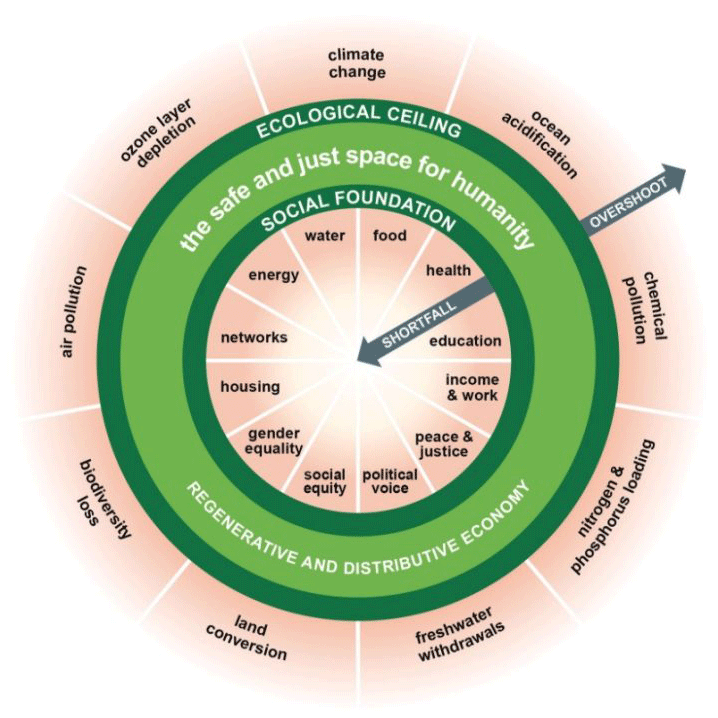Among the bad habits of humanity (see previous post) which now threaten the biosphere, two of the worst are population growth and economic growth. The first is easy enough to understand: in my own lifetime, the human population of the world has tripled from 2.5 billion to 7.7 billion, and this explosive growth continues to this day. It’s bad news for the many life forms who have been displaced by human settlement (and human travel!), because living space is limited on this planet. Even if every human lived economically, i.e. lived “within their means” by making more efficient use of energy and resources, humanity would run out of Earthroom sooner or later – and not before driving most of our wild neighbors to extinction.
But the growth of “the economy,” as measured in most countries by GDP (Gross Domestic Product), makes the situation far worse, and this is not as obvious. GDP measures the amount of money in circulation, and thus it grows with every oil spill, every war, and every case of cancer, because these cost money to deal with. It also grows when people consume energy and resources they don’t need, when the rich get richer, and when working people are well paid for doing jobs that pollute the earth and steal resources from future generations. What does this have to do with the real economy or with human well-being? Why are we so addicted to economic growth when there are healthier ways to run an economy?
Maybe the very concept of growth has something to do with our addiction. That concept is a symbol, and so is the word we use to invoke the concept. According to C.S. Peirce, Symbols grow. What did he mean by that? Certainly those of us connected to the Internet have more access to information than anyone did in Peirce’s time, but how is that fact related to the kind of growth he had in mind? Just what is that kind of growth, and how is it related to the growth of living things? Concerning situations like climate change, is it part of the problem, or part of the solution, or both?
First let’s have a look at how Peirce developed the idea. The following is taken from a book chapter he wrote in 1894:
Symbols grow. They come into being by development out of other signs, particularly from likenesses or from mixed signs partaking of the nature of likenesses and symbols. We think only in signs. These mental signs are of mixed nature; the symbol-parts of them are called concepts. If a man makes a new symbol, it is by thoughts involving concepts. So it is only out of symbols that a new symbol can grow. Omne symbolum de symbolo. A symbol, once in being, spreads among the peoples. In use and in experience, its meaning grows. Such words as force, law, wealth, marriage, bear for us very different meanings from those they bore to our barbarous ancestors. The symbol may, with Emerson’s sphynx, say to man,
Of thine eye I am eyebeam.
— Peirce, EP2:10
(The difference between symbols and other signs is introduced in Chapter 3 of Turning Signs, and Emerson’s sphynx makes an appearance in rePatch ·12.) For now, let us focus on Peirce’s vague remark about what happens when a symbol ‘spreads among the peoples’: ‘In use and in experience, its meaning grows.’ Surely there must be more to the growth of meaning than mere increase in the number of people using the symbol. Peirce gives examples of words which ‘bear for us very different meanings from those they bore to our barbarous ancestors.’ Does he mean that concepts have changed while the words naming them have remained the same? If so, why should we think that the concepts are growing rather than changing in some other way?
Indeed, how do we know what those words meant to our ancestors in the first place? Who were these ‘barbarous’ ancestors, anyway? The English root word “barbar-” is derived from a Greek word which originally referred to people who didn’t speak Greek but some other language which sounded ‘barbarous,’ meaning uncivilized, to Greek ears. But if our barbarous ancestors didn’t speak English, what could it mean to say that they meant something by an English word which bears a different meaning for us? Probably Peirce didn’t mean that at all; rather he meant, by the word ‘word’, something that takes different forms in different languages, and yet differs in meaning only to the extent that children differ from their parents and more distant ancestors.
It seems that in order to understand how meanings grow over generations and centuries and millennia of word usage, we should take a closer look at how languages evolve. In my next post or two, I propose to start doing this by tracing the history of the verb grow back about 5000 years to the time of our ‘our barbarous ancestors’ who spoke a Proto-Indo-European language.
Maybe, eventually, we’ll be able to look the sphynx in the eyebeam.
